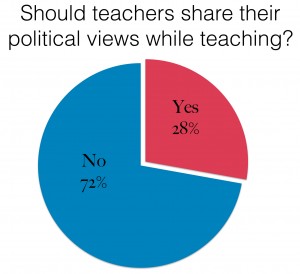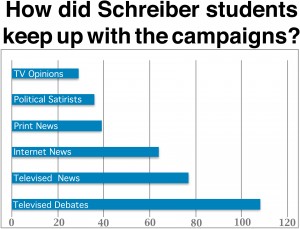On Nov. 6, citizens across the country headed to the polls to elect the next President of the United States. Although only a handful of Schreiber students were eligible to vote, “election culture” certainly pervaded the school in the days, weeks, and months prior to the election, and students, teachers, and staff members developed a level of heightened political awareness.
The Politics of the Classroom
When students attend classes, they are not only studying set curricula from textbooks, novels, and handouts. In class, students observe and learn from their teachers’ ideas, outlooks, and personal perspectives.
As a result, many teachers try to maintain their classrooms as unbiased environments, and attempt to conceal their political views from students.
“It is important to not take one side, because then you shut out people who have the opposite political beliefs,” said social studies teacher Mr. George Muhlbauer. “I think that it is not the teacher’s job to force their political views onto someone. Even by a teacher explaining their political views, you might unintentionally sway some students to it, when you really just want to give them both sides and have them make their own decisions.
Still, camouflaging political beliefs and affiliations can be difficult for anyone.
“It doesn’t really make a difference whether they tell you or not, because their teaching styles often reflect what they actually believe,” said senior Lani Hack. “In the past, my teachers haven’t actually told me what they believe, but I can easily figure it out.”
Some teachers, conversely, make conscious efforts to be honest with students and discuss their political affiliations.
“The classroom is supposed to be a place for discourse, and through mutual discourse, this is how we get to know about each other, and that’s how barriers are broken down,” said social studies teacher Ms. Renee McClean.” “It’s really a part of the passion that I have for this subject. I would want to be more authentic to my students . . . It’s almost hypocritical to say ‘I don’t have a position on that.’ Why am I this dark, mysterious person? I’m not. I believe that everybody has valid points of view.”
Board of Education policy 4810, which has remained unchanged since 1993, discusses pupil’s rights when learning about controversial issues, including political ones. The policy indicates that students have the right to “study under competent instruction in an atmosphere free from bias and prejudice.”
“I don’t want teachers to use their classroom as a pulpit so that they can get their views out and try to convince students to agree,” said Principal Mr. Ira Pernick. “But, at the same time, I don’t want teachers to feel as if they can’t speak.”
According to the Board of Education, students also have the right “to form and express [their] own opinion[s] on controversial issues without thereby jeopardizing the relationship with the teacher or the school.”
“I feel when a teacher shares their political beliefs, it’s pretty inappropriate,” said a student who asked to remain anonymous. “I don’t think that they should share their beliefs, because they can make me feel badly about my own. What if they subconsciously grade based on it? If they don’t agree, they could not like me.”
In 2008, debate over a district policy similar to ours reached federal courts, when a major teachers’ union, the United Federation of Teachers, sued New York City schools. The courts upheld the policy, which states that teachers must remain politically neutral while teaching, by denying teachers the right to wear political buttons in the classroom.
“I think that, on the high school level, it is a challenge to remain completely neutral all of the time,” said Mr. Pernick. “While I don’t necessarily think I would be comfortable with somebody wearing a button that said Obama or said Romney on it, I do understand that in the course of conversation, teachers are asked questions.”
While teachers appear split in their feelings about sharing their political beliefs with students, students, when polled, replied overwhelmingly that teachers should not openly discuss their political beliefs while teaching. Of the 115 students polled, nearly three-quarters felt this way.
The Political Culture
Anyone who has ever belonged to a minority group can identify with many of the sentiments expressed by non-Democrats sitting amongst a sea of like-minded peers. This can get especially uncomfortable while sitting through biased lectures or tangents in classes across the board.
“As a Libertarian I am a part of the minority in Schreiber,” said senior Conor Boyle. “Being a part of the minority I have been in some awkward situations in my classes. Both the teachers and students who embody the majority have put me on the spot or treated me differently during class times where I contribute to a discussion.”
Lectures, however seem to elicit the strongest responses from fellow students, leaving those of the minority opinion often frustrated in the process. Students have noticed that their peers tend to be less tolerant during debates even with a teacher playing devils advocate to mediate.
“Many students tend to be intolerant of others’ political views,” said senior Josh Freidman. “Anyone on the right or left won’t budge on their stance or see any merit in others’ opinions.”
Additionally, many standing in the minority camp feel that their opponents’ opinions are sometimes not well researched or altogether not their own.
“It is not necessarily a bad thing, but kids tend to follow the political views of their parents and don’t go and take the time to research the candidates and form their own opinions,” said junior Lauren Livingston.
Due to the climate in which we are raised it is unsurprising that many students adopt the views of their parents. Some even come to passionately support those views, and do their own research to support their assertions.
“I think that there are a number of students who take what their parents say as political dogma. However, there is no problem with that even though in my situation, my parents and I have differing view points and engage in heated debates over the issues,” said Boyle.
It is never easy to be amongst the few who disagree with what their classmates seem to be arguing. And while many can glean new opinions from in-class discussions about controversial topics, when conversations tend to trend in a certain direction it can become difficult to speak up, especially in the face of criticism.
Senior Josh Freidman, a self-described communist, comes across this often while listening to the way people speak about certain topics or even lecture in history.
“A fairly small minority of students at Schreiber identify themselves as communists. While some people share similar views but are afraid to and/or don’t label themselves as communists,” said Freidman.
While many students are concerned about their peers lack of political enthusiasm and participation in government, many expressed excitement about the upcoming election, showing their support through social networking sites such as Facebook and Twitter as well as writing letters and campaigning for their candidate of choice.
“While I can’t vote, I have worked on petitions and written letters to local and state officials about labor rights and minimum wage for summer jobs,” said Freidman.
“People are talking about it all the time and for the most part our school is politically aware, but sometimes people just write something funny about the elections on Twitter,” said senior Jamie Weiss.
Still many of the views expressed seem to be silly or lack a fundamental argument and exert a more mocking air of the candidate of which they disapprove.
“I have tried my best to keep my political views from being shared on Twitter on Facebook primarily because I do not want to have to deal with the numerous responses of people who want to debate me when I am just trying to comment on the only debate that matters, the one between the two candidates,” said Boyle.
The Candidates
If the 2012 presidential election took place exclusively in Schreiber, President Barack Obama would have enjoyed the greatest landslide victory in election history. 63 percent of students who voted in the National Honor Society’s mock election chose the current president and Democratic party candidate, Obama, as their favored presidential candidate. 25 percent picked Republican candidate Mitt Romney and the remaining 12 percent voted for various third party candidates such as Green Party candidate Jill Stein, and Libertarian candidate Gary Johnson. It may not be surprising that the student body is largely left-leaning, but where do students stand on the issues? What is it about President Obama’s policies makes him such an alluring candidate?
“The school’s political climate is very liberal,” said senior Miles Kurtz. “I think that a lot of people’s parents have kind of influenced the way that they think about politics. They know who they support, but if you ask them, they can’t coherently argue why.”
Port Washington lies within New York’s 5th congressional district, which has voted for the Democratic Party in every presidential election since 1992. Statistically, one could expect that the vast majority of Port Washington adults are Democrats.
Polls indicated that the student body is at least trying to stay informed, with nearly all students responding that they had tuned into at least one of the televised debates, and many others using other media outlets to keep up with the election (figure B).
“I’ve followed the election through watching debates and reading articles in the newspaper. I think it’s important for students to be politically aware because even though we can’t vote this year, this decision will affect us for the next four,” said senior Summer Jiries.
For high school and future college students, education is a critical issue.
“This election is particularly important for students because in the next four years we will be going to colleges and looking for jobs,” said senior Mary Puglisi. “Students should become familiar with the issues in order to make an informed decision.”
Obama’s rhetoric has emphasized Pell grants and financial assistance to alleviate the burden on college students, falling short of Green Party candidate Jill Stein’s call for free higher education. Romney opposes federal student loans, which he argues have driven the price of a college education up.
On the K-12 level, the two have disagreed on the implementation of a voucher system that would allow for public funds to be used to pay the tuitions of private schools. Obama opposes the voucher system, pointing to studies demonstrating that students attending private schools with vouchers do not perform better than children in public schools. Romney has endorsed voucher systems and emphasizes giving families the ability to choose which schools they wish to send their children to.
Students also seem to be very interested in the candidates’ views on two particularly controversial topics: abortion and contraception. Obama and Romney’s positions on abortion can be generalized as “pro-choice” and “pro-life,” respectively.
“Electing Romney would set women’s rights back a decade,” said senior Ellie Zolatarev. “He has absolutely no knowledge concerning abortions; he just opposes them because of his religious beliefs.”
Judging from our poll results, students are either unaware of or unimpressed by third party candidates. Of the several third party candidates, only Stein and Libertarian candidate Gary Johnson have access to enough electoral votes to win the election. However between the four candidates Stein received just four votes from students throughout the mock election.
“Who is Jill Stein?” said senior Jongho Byun.
On Election Day, some of Schreiber’s own came out to vote.
“If a student is able to vote they absolutely should because it is their duty as an American,” said senior Alex Gatehouse.
“It’s frustrating because many Americans are taking their eligibility for granted and are either uniformed or not voting at all. Because of the age limit there isn’t much we can do about it, said senior Emily Ryon.


